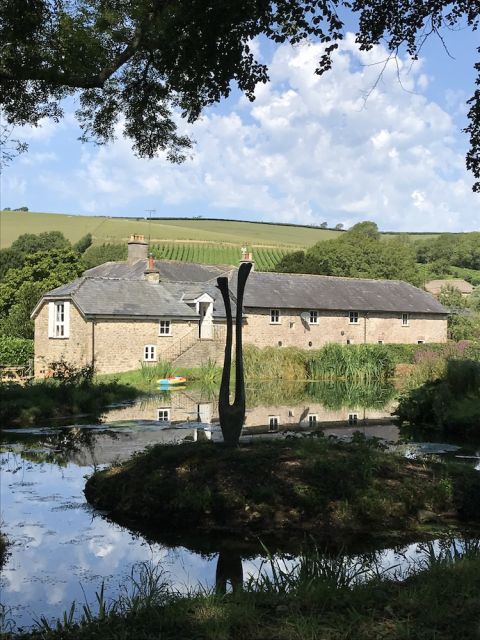Steven is now a vine grower and produces Bride Valley sparkling wine from slopes near his house in Dorset. The Bride Valley office, tasting room, wine and art room and eventually a club room (he is setting up a members club to offer 15% off for a guaranteed purchase of six bottles a year) are all in the stable block behind his house. He says, ‘the verdant and wooded part behind this is a lovely place for visitors to taste in good weather and this is where I have put some of my sculptures collected over the years.’ He shares the bench above with The Sleeping Hare by local artist Clare Trenchard. Below is Spring by Marzia Colonna – a cousin of the Ricasolis, Steven points out – with the vineyard in the distance.
I asked Steven what he felt were his greatest contributions to the world of wine over the many decades he has been involved so intimately with it. This is how he responded.
‘It is without doubt the creation of L’Académie du Vin in Paris and by extension the Christie’s Wine Course in London. Both were based entirely to communicate the origins of the various wines: place, grape(s), why they tasted like they did and the pleasure to be gained from this. I had planned to call the Paris school L’Ambassade du Vin as I thought of myself, and still do as an overall trait, as a wine ambassador not a wine teacher, but the name was taken and like so many bits of luck I had along the way, L’Académie was not. For 15 years in Paris the AdV really was the only game in town for ongoing wine courses at every level. Michael Broadbent and I ran the Christie’s Wine Course for 30 years, JMB opening the first session in September 1982 and again in October 2011.
‘Of course the Paris 1976 tasting that L’Académie created was much more important for the world of wine, but it wouldn’t have happened had not the school been there, and Patricia Gallagher and I so keen, once knowing the wines, to promote them in an totally altruistic manner.
‘I also think my books played their part in the early-mid 1980s. I loved writing the first one – French Country Wines dedicated to Digby, our Berger Briard, a perfect French country dog. You have said quite correctly that I am perhaps too keen on minor wines, but petits vins are there for pleasure and for committed wine drinkers like me, and that’s a big plus. The Académie du Vin Wine Course was, I think, the first of the "how to" books, well after Michael’s Wine Tasting of course, but it really hit the spot in the French edition and was widely translated. This said, the Académie du Vin Guide to French Wines, a combination of the two handbooks French Country Wines and French Fine Wines, remains the one I am most proud of. It was written by someone with a passion to communicate what he knew about the whole wine scene in France, in which I was bang in the middle. I still refer to it from time to time.’
I also asked him to outline his hopes for the future of wine:
‘I sense we are on the same page on this, witnessing the declining wine consumption around the world, especially amongst the young, while the wine producers of all ages have never been more dedicated to producing wines of quality and above all of individuality. For me, right from the start, there are two vital elements in wine that must never be lost: the fact that it is a cultural object and the fact that it encourages conviviality. The glass of Cockburn 1908 which inspired me on Christmas Eve 1954 is the cultural/intellectual/historical side which is endlessly fascinating. I am just starting again on Hugh’s The Story of Wine and it is all there and more – while the conviviality that was so evident in the bistros and trattorias that my parents took my brother and me to in the late 1950s was equally important. Perhaps more, as the pleasure of sharing a glass of wine should never die, while the whys and wherefores of its existence may not be remembered.
‘My hope for the future is that wine continues to be produced with the personal commitment so obvious today and that people continue to drink it. Again, communication, where your Purple Pages reign supreme, is the key. Decanter does a very good job, with Hugh J and Andrew J representing both sides of the equation. I was always happy with my articles, as they were opinionated but overall informative as to the qualities and hence the pleasure of wine. Its raison d’être is to keep on being produced for people to appreciate it all around the world. The loss of wine as a cultural and convivial object would be a very, very serious loss to the world and I hope that it never happens.’
You can order Steven Spurrier: A Life in Wine here and visitors to JancisRobinson.com are offered £5 off the full price of £30 by using the discount code JANCIS5.















